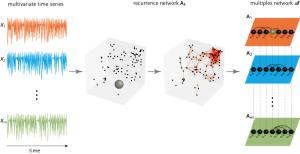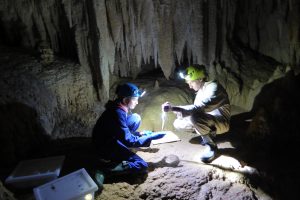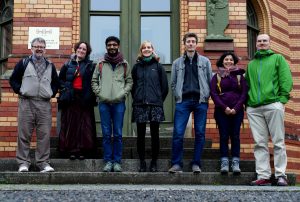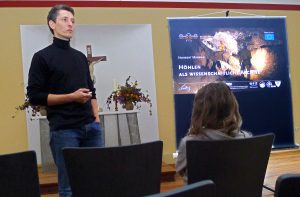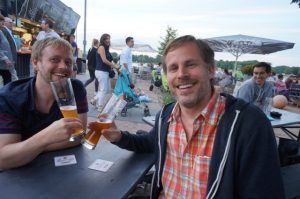During her scientific stay in New Zealand, Cinthya published her experiences in her “The Cave Journey” blog: https://thecavejourney.wordpress.com/
News
Novel numerical method to analyse multivariate proxy records
Members of the QUEST team have published a new approach for analysing multivariate proxy records with recurrence networks. The idea is to first consider each proxy separately as a recurrence network, then combine them as layers of a multiplex network, and derive a similarity measure from this resulting multiplex recurrence network. This approach can be used to reveal periods of converging dynamics or very disperse variability, as demonstrated on an example of palaeo vegetation development during the last 16 ka in East Asia.
https://journals.aps.org/pre/abstract/10.1103/PhysRevE.97.012312
EGU 2018 Session SC1.10/CL6.06/GM12.4/SSP2.20
We´d like to invite everybody interested in innovative and quantitative methods for continental palaeoenvironmental reconstructions to attend our short course (details below) at the General Assembly of the European Geosciences Union, 8-13 April 2018.
SC1.10/CL6.06/GM12.4/SSP2.20 Age Models and geochronology: An introductory course to different age-depth modelling approaches (co-organized) Convener: Carole Nehme Co-Conveners: Sebastian F.M. Breitenbach , Michael Dietze , Annegret Larsen Abstract: In an era of science that uses numerical models to better understand physical processes occurring on Earth, there is an increasing demand for robust empirical datasets to constrain these simulations. Generating robust datasets, especially data sets that express stratigraphic positions of sedimentary deposits as ages, often involves the use of multiple, independent geochronological techniques (e.g. different kinds of radioisotopic dating, magneto-, bio-, cyclostratigraphy and sedimentologic relationships along the succesion). The integration of these different kinds of geochronological information often poses challenges. Age-depth models are the ultimate result of the integration of different geochronological techniques, and range from linear interpolation to more complex Bayesian techniques. Invited speakers Christian Zeeden and David De Vleeschouwer will share their experience in several modelling concepts and their application in a range of paleoenvironmental and paleoclimatic records. The Short Course will provide an introduction to the field of (Bayesian) age-depth models and will highlight the assumptions, benefits and limitations of different model approaches. It will prepare the participants from CL, GM and SSP divisions for independent application of suitable age-depth models to their data.
We hope you will enjoy this short course.
Please feel free to contact us if you have any questions.
Hope to see you in Vienna and
Merry Christmas!
Seb, Carole, Michael and Annegret
Short course page at the EGU website:
http://meetingorganizer.copernicus.org/EGU2018/session/28970
EGU 2018 Session CL1.11
We´d like to invite everybody interested in innovative and quantitative methods for continental palaeoenvironmental reconstructions to submit abstracts for our session (details below) at the General Assembly of the European Geosciences Union, 8-13 April 2018.
CL1.11 Novel and quantitative methods for continental palaeoenvironmental reconstruction. Convener: Jessica Oster Co-Conveners: Sebastian F.M. Breitenbach , Bethany Fox , Adam Hartland Abstract: In recent decades, quantitative methods have become increasingly important in the field of palaeoenvironmental and palaeoclimatic reconstruction, due to the need for comparison between different records and to provide boundary conditions for computational modelling. Continental environmental archives (e.g. speleothems, lake sediments, ice, or land snails) are often highly temporally resolved (subdecadal to seasonal) and may provide more direct information about atmospheric processes than marine archives. The wide variety of archive types available on land also allows for intercomparison and ground-truthing of results from different techniques and different proxies, and multi-proxy reconstructions from the same archive can disentangle local and supra-regional environmental conditions.
This session aims to highlight recent advances in the use of innovative and quantitative proxies to reconstruct past environmental change on land. We welcome studies of any continental archive, including but not limited to carbonates (caves, paleosols, snails), sediments (lakes, rivers, alluvial fans), ice, and biological proxies (tree rings, fossil assemblages, plant biomarkers). We particularly encourage studies involving the calibration of physical and chemical proxies that incorporate modern transfer functions, forward modeling and/or geochemical modeling to predict proxy signals, and quantitative estimates of past temperature and precipitation amounts. We also welcome reconstructions of temperature and hydrologic variability over large spatial scales, including paleoclimate data assimilation studies. This session will provide a forum for discussing recent innovations and future directions in the development of terrestrial palaeoenvironmental proxies on seasonal to multi-millennial timescales.
We hope you will enjoy this session.
Please feel free to contact us if you have any questions.
Hope to see you in Vienna and
Merry Christmas!
Seb, Beth, Jessica and Adam
Session page at the EGU website:
http://meetingorganizer.copernicus.org/EGU2018/session/28897
A very active southern hemisphere team!
At the end of November, Beth and Cinthya had a very fruitful time while participating at the annual conference 2017 of the Geoscience Society of New Zealand, presenting preliminary findings of speleothem magnetism and cave monitoring in and around Waipuna cave.
In the meantime, Adam, Inken, and Cinthya had an intense work in the field visiting Waipuna cave to carry out the SH summer monitoring collecting water samples from the drip points and taking measurements of the physicochemical properties. Additionally, the team installed the first sampling device for the analysis of cave organic aerosols, with the objective of characterizing the cave´s response to external conditions. After, 5 field trips and a lot of hours of intense work underground, the team returned home tired but very happy, with many samples and a bunch of data ready to be analyzed at the Waikato University, University of St Andrews, and Johannes Gutenberg-Universität laboratories. Now, all of us are looking forward to the next adventure.
Workshop on palaeoclimate time series analysis and statistics in Potsdam
Last week, representatives of all QUEST collaborators met on the Telegrafenberg in Potsdam for the QUEST Workshop on palaeoclimate time series analysis and statistics to disseminate our results, first among ourselves, and then to a public audience. We would like to thank all participants for their contributions and lively discussions.
The workshop was very nicely organized by Bedartha and Norbert. Beth came all the way from New Zealand, while David came from Great Britain, Inken from Mainz, and Seb and Cinthya from Bochum. We started with a short summary of ongoing work and activities in the different laboratories. An important point raised and discussed were the planned secondments (Cinthya and Inken had aleady packed for their secondments to Waikato!) and under which conditions Thomas can actively participate to QUEST. We then got quick updates from the different laboratories, all make good progress with respect to quantification of proxy data. A cosy workshop dinner in Old Town Potsdam facilitated more discussions of ideas and thoughts.
On Thursday and Friday we had several lectures and hand-on sessions, open to the public. Colleagues from as far as Australia learned about agemodeling, recurrence analysis and other innovative statistical tools developed at PIK Potsdam. Hands-on sessions gave the opportunity to discuss the complexities of unpublished data and the subtilities hidden inside the obvious.
The workshop also served as a platform to strike new collaborations and to exchange ideas how to extract a wealth of information from multi-proxy data.
The next workshop will take us to the Antipodes.
Public outreach at the 20th anniversary of the Speleo Club Berlin
The Speleo Club Berlin is a small caving club of cavers from Germany’s capital and surrounding region. At the 20th anniversary of this club in the assembly hall of the “Radfahrer-Kirche” in Kienitz at September 23rd 2017, Norbert gave a public talk on several scientific aspects of cave research, including speleothem based palaeoclimate studies as performed within QUEST. The audience, consisting not only of speleologists but also of the curious public, has been very interested and enquiring.
Presenting research at the recurrence plot symposium
The Seventh International Symposium on Recurrence Plots took place this August in São Paulo, Brazil. Norbert was one of the organizers and had the opportunity to present (besides more theoretical work) also a study partly developed within QUEST: Multiplex Recurrence Networks. In this work, together with Deniz Eroglu (Imperial College, London, UK, now at Northwestern University, Evanston, US) and Martina Stebich (Senckenberg Museum, Weimar, Germany) the recurrence plot approach was combined with the multiplex network concept to investigate regime transitions in multivariate palaeoclimate proxy records.
Lab meeting at JGU Mainz
Adam is currently visiting the JGU Mainz lab, testing various fluid compositions (see proof in figure). Denis and (now Dr.) Max were very helpful in explaining the artificial cave and issues related with precipitating carbonates.
Seb and Matthias joined from RUB to discuss experiments that Matthias will conduct during his MSc thesis in Mainz and to plan the field and lab work in New Zealand later this year. Cinthya, Inken, and Max will visit Waikato in winter and perform experiments in Adam´s lab, take care of the monitoring and to take samples from speleothems.
A very long, but productive day was concluded with dinner and beer at the Main terraces.
Hallo Welt!
The QUEST Team will soon be reinforced by our new PhD student at RUB – Cinthya. To prepare her for regional Pott-Communication she currently participates in a German Language course in Cologne (the wrong side of the Rhine river). The DAAD is doing an excellent job, not only providing the German training, but also offering get-togethers, excursions and much more. If this really helps to prepare Cinthya for the traditional Bochum “Currywurst”* – well, we´ll see…
*the true Currywurst is – of course – only available in Berlin!
